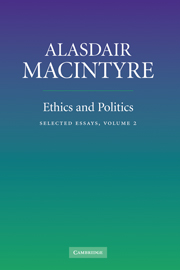Book contents
- Frontmatter
- Contents
- Preface
- Acknowledgments
- PART I LEARNING FROM ARISTOTLE AND AQUINAS
- PART II ETHICS
- PART III THE POLITICS OF ETHICS
- 8 Three perspectives on Marxism: 1953, 1968, 1995
- 9 Poetry as political philosophy: notes on Burke and Yeats
- 10 Some Enlightenment projects reconsidered
- 11 Social structures and their threats to moral agency
- 12 Toleration and the goods of conflict
- Index
11 - Social structures and their threats to moral agency
Published online by Cambridge University Press: 27 January 2010
- Frontmatter
- Contents
- Preface
- Acknowledgments
- PART I LEARNING FROM ARISTOTLE AND AQUINAS
- PART II ETHICS
- PART III THE POLITICS OF ETHICS
- 8 Three perspectives on Marxism: 1953, 1968, 1995
- 9 Poetry as political philosophy: notes on Burke and Yeats
- 10 Some Enlightenment projects reconsidered
- 11 Social structures and their threats to moral agency
- 12 Toleration and the goods of conflict
- Index
Summary
THE CASE OF J
Imagine first the case of J (who might be anybody, jemand). J used to inhabit a social order, or rather an area within a social order, where socially approved roles were unusually well defined. Responsibilities were allocated to each such role and each sphere of role-structured activity was clearly demarcated. These allocations and demarcations were embodied in and partly constituted by the expectations that others had learned to have of those who occupied each such role. For those who occupied those roles to disappoint those expectations by failing to discharge their assigned responsibilities was to invite severe disapproval and other sanctions. To refuse to find one's place within the hierarchies of approved roles, or to have been refused a place, because judged unfit for any such role, was to be classified as socially deviant and irresponsible.
The key moral concepts that education had inculcated into J were concepts of duty and responsibility. His fundamental moral beliefs were that each of us owes it to others to perform her or his assigned duties and to discharge her or his assigned responsibilities. A good human being performs those duties, discharges those responsibilities, and does not trespass into areas that are not her or his concern. A philosopher who comes across the likes of J will understand his attitudes as cultural parodies, in part of Plato (conceiving of justice as requiring “that each do her or his own work and not meddle with many things,” Republic 433a) and in part of Kant (doing one's duty just because it is one's duty and not for the sake of any further end), authors who had influenced J's schoolteachers.
- Type
- Chapter
- Information
- Ethics and PoliticsSelected Essays, pp. 186 - 204Publisher: Cambridge University PressPrint publication year: 2006
- 10
- Cited by



